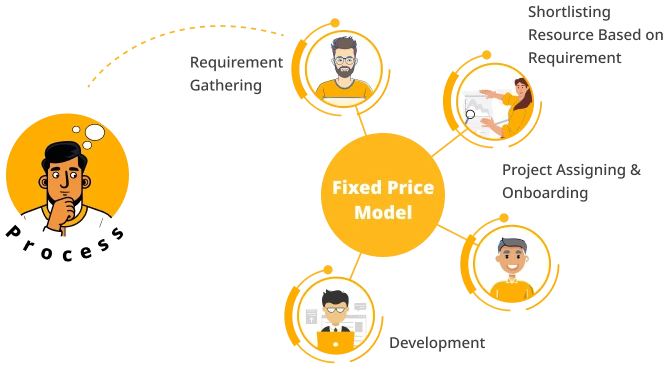At ValueCoders, we help businesses unlock the power of data through advanced Business Intelligence solutions. With 20+ years of experience, 650+ BI specialists, and a 97% client retention rate, we ensure your data works harder, smarter, and faster for your business growth.

They go above and beyond to ensure quality and satisfaction. A true partner in every sense.
- Rebecca
Our business intelligence (BI) services involve designing, developing, and deploying systems to effectively collect, analyze, and manage business data.
Get expert BI consulting tailored to your business goals. We ensure smarter use of BI tools to drive growth and better decisions.
Deploy and integrate advanced BI solutions seamlessly. Our team ensures smooth data flow, reporting, and optimized configuration.
Access insights anytime with our cloud-based BI solutions. Enjoy scalability and flexibility without heavy infrastructure costs.
Keep BI systems secure and optimized with our managed services. We handle monitoring, upgrades, and support for smooth operations.
Upgrade legacy BI systems to cloud-ready, scalable platforms. Unlock AI-driven insights, better visualization, and future-ready performance.
Get custom BI apps, dashboards, and reporting tools. We turn complex data into actionable insights for smarter decisions.
Design and build a robust BI architecture tailored to your business needs. Ensure seamless data integration, high performance, and scalable analytics.
Keep your BI systems reliable and future-ready with continuous support and iterative enhancements. We ensure smooth operations while evolving with your business needs.
ValueCoders’ BI solutions offer a holistic view of your operations, enabling better strategic planning and execution.

At ValueCoders, our BI services are powered by a team skilled in the latest analytics tools, AI-driven insights, and cloud-based platforms.
We deliver BI solutions that empower smarter decisions, reduce reporting cycles, and unlock real-time business performance insights.
ValueCoders' Business Intelligence services can empower your organization with intelligent insights for growth.
Partnering with businesses in diverse sectors to unlock new avenues for growth and innovation.
We follow the structured process of a premier Business Intelligence solution provider strategically tailored to steer your organization toward unparalleled success by harnessing the true potential of data-driven strategies.
First, we identify growth opportunities and challenges through comprehensive trend analysis.
We anticipate future trends and outline scenarios to ensure success and adaptability.
ValueCoders detects mismatches, bottlenecks, and capacity issues in strategic planning.
We measure performance against benchmarks and analyze deviations from expected outcomes.
Our team gains insights from data to highlight growth opportunities and potential business risks.
Lastly, we utilize analytics insights to improve internal processes and drive operational efficiency.
Choose from our flexible hiring models designed to fit your needs and budget.
For businesses with well-defined project scope and requirements.

For businesses with long-term project requirements or complex development process. They get more control of the process.

For businesses looking to pay for completed project instead of committing to fixed project cost.

BI consulting company offers tools, technologies, and practices that enable organizations to gather, analyze, and visualize data to gain valuable insights and make informed decisions. These services involve transforming raw data from various sources into meaningful and actionable information, empowering businesses of all sizes and industries with the following key benefits:

Business Intelligence (BI) services are crucial in improving a company’s data-driven decision-making process by providing comprehensive data analysis and insights. Here are the key ways in which BI services can help your company:
By utilizing the power of Business Intelligence as a service, your company gains valuable insights, aligns its strategies with data-driven evidence, and achieves improved productivity, increased profitability, and sustainable growth.
A Business Intelligence (BI) system can integrate various data sources to view an organization’s operations and performance comprehensively. Some common data sources that can be integrated into a BI system include:
By integrating these diverse data sources, a BI system can provide valuable insights and enable data-driven decision-making across all levels of an organization, contributing to its overall success and competitive advantage.
Safeguarding sensitive data within a Business Intelligence (BI) solution is essential to protect confidential information from unauthorized access and breaches. Here are some common security measures that are typically in place to ensure data security within a BI solution:
By implementing these robust security measures, BI solutions ensure the confidentiality, integrity, and availability of sensitive data, instilling user confidence and maintaining trust in the organization’s data-driven decision-making processes.
A comprehensive Business Intelligence (BI) solution consists of several key components that gather, analyze, and present data meaningfully. These components form a cohesive ecosystem to support data-driven decision-making. Here are the key components of a BI solution and their roles:
All these components work together to enable data discovery, analysis, and decision-making, empowering businesses to gain valuable insights, improve operations, and stay competitive in their industries. The seamless integration and collaboration among these components create a cohesive BI ecosystem that transforms raw data into actionable information for the organization’s benefit.
The field of Business Intelligence (BI) continues to evolve with new trends and innovations that enhance decision-making and analytics. Some of the latest trends and advancements in BI services include:
These trends and innovations in BI services are geared towards making data analysis more intuitive, accessible, and powerful. By embracing these advancements, organizations can enhance their decision-making capabilities, gain deeper insights from data, and remain competitive in today’s data-driven business world.

Artificial Intelligence (AI) and Machine Learning (ML) play a significant role in modern Business Intelligence (BI) services, transforming the way data is collected, analyzed, and presented. Here are some key roles that AI and ML play in modern BI services:
AI and ML in modern BI services empower organizations to extract deeper insights from data, automate repetitive tasks, and make data-driven decisions with greater accuracy and speed. By utilizing these advanced technologies, BI services become more intelligent, user-friendly, and capable of handling complex data analysis, driving better business outcomes.
Ans. ValueCoders is trusted by 650+ global clients and backed by India’s top 1% BI and data engineering talent. We’ve:
With proven expertise, strict data security, and on-time delivery, we ensure your BI initiatives drive measurable business impact.
Ans. The cost of implementing a BI solution with ValueCoders typically ranges from $80,000 to $1,000,000. This variation depends on factors such as the complexity of the solution, the number of users and data sources, data volume, and the intricacy of data cleansing and reporting. Additional costs may arise based on the inclusion of machine learning algorithms and advanced analytics.
Ans. ValueCoders’ data analytics solutions encompass a range of components and processes, including:
Ans. Our BI solution package typically includes data integration, reporting, analytics, dashboard creation, data quality management, and ongoing support. We tailor each package to meet your specific business needs.
Ans. The implementation timeline for a BI solution varies based on complexity, ranging from a few weeks to several months. We work closely with you to provide a detailed timeline based on your specific requirements.
Ans. We can create a wide range of reports and dashboards, including operational, financial, and executive summaries. Our solutions are tailored to provide insights tailored to your specific business needs.
Ans. Yes, ValueCoders specializes in integrating BI solutions with existing systems such as ERP, CRM, and other data sources to ensure seamless data flow and comprehensive analytics.
Ans. Yes, ValueCoders offers ongoing support and maintenance services, including system updates, troubleshooting, and user training, to ensure your BI solution continues to meet your evolving business needs.
We are grateful for our clients’ trust in us, and we take great pride in delivering quality solutions that exceed their expectations. Here is what some of them have to say about us:

Co-founder, Miracle Choice

Executive Director

Director

Director
Trusted by Startups and Fortune 500 companies
We can handle projects of all complexities.
Startups to Fortune 500, we have worked with all.
Top 1% industry talent to ensure your digital success.



Let's discuss how we can bring your vision to life.